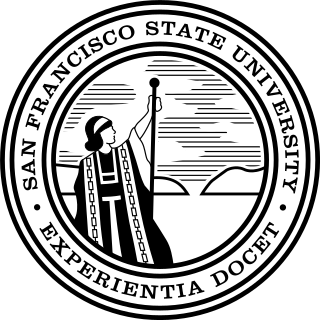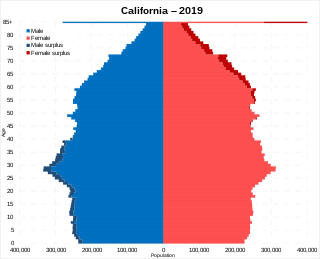
Vallejo is a city in Solano County, California and the second largest city in the North Bay region of the Bay Area. Located on the shores of San Pablo Bay, the city had a population of 126,090 at the 2020 census. Vallejo is home to the California Maritime Academy, Touro University California and Six Flags Discovery Kingdom.

San Francisco State University is a public research university in San Francisco. It is part of the California State University system and offers 118 bachelor's degree programs, 94 master's degree programs, and 5 doctoral degree programs along with 26 teaching credentials among six academic colleges. It is classified among "R2: Doctoral Universities – High research activity".

Chinese American Citizens Alliance (C.A.C.A.) is a Chinese American fraternal, benevolent non-profit organization founded in 1895 in San Francisco, California to secure equal rights for Americans of Chinese ancestry and to better the welfare of their communities. C.A.C.A. is the United States' oldest Asian American civil rights organization.
Asian American Studies is an academic discipline which critically examines the history, issues, sociology, religion, experiences, culture, and policies relevant to Asian Americans. It is closely related to other Ethnic Studies disciplines, such as African American Studies, Latino Studies, and Native American Studies.

California is the most populated U.S. state, with an estimated population of 38.9 million as of 2023. It has people from a wide variety of ethnic, racial, national, and religious backgrounds.
Cesar Yatco Alzona Laguna, Philippines, was the author of the original first Philippine Marines Hymn. He also authored another Marine-themed song, entitled "First to Fight." He served valiantly and received much praise as a military leader in the Marine Corps of the Philippine Navy against Muslim terrorists and Islamic insurgents in the southern island of Mindanao during the early years of Philippine independence from the United States in the 1950s. He was also one of the Filipino military personnel of the Korean war.

Asian/Pacific American (APA) or Asian/Pacific Islander (API) or Asian American and Pacific Islanders (AAPI) or Asian American and Native Hawaiians/Pacific Islander (AANHPI) is a term sometimes used in the United States when including both Asian and Pacific Islander Americans.

The history of Filipino Americans begins in the 16th century when Filipinos first arrived in what is now the United States. The first Filipinos came to what is now the United States due to the Philippines being part of New Spain. Until the 19th century, the Philippines continued to be geographically isolated from the rest of New Spain in the Americas but maintained regular communication across the Pacific Ocean via the Manila galleon. Filipino seamen in the Americas settled in Louisiana, and Alta California, beginning in the 18th century. By the 19th century, Filipinos were living in the United States, fighting in the Battle of New Orleans and the American Civil War, with the first Filipino becoming a naturalized citizen of the United States before its end. In the final years of the 19th century, the United States went to war with Spain, ultimately annexing the Philippine Islands from Spain. Due to this, the History of the Philippines merged with that of the United States, beginning with the three-year-long Philippine–American War (1899-1902), which resulted in the defeat of the First Philippine Republic, and the attempted Americanization of the Philippines.

The demographics of Filipino Americans describe a heterogeneous group of people in the United States who trace their ancestry to the Philippines. As of the 2020 Census, there were 4.4 million Filipino Americans, including Multiracial Americans who were part Filipino living in the US. Filipino Americans constitute the third-largest population of Asian Americans, and the largest population of Overseas Filipinos.
The Watsonville riots was a period of racial violence that took place in Watsonville, California, from January 19 to 23, 1930. Involving violent assaults on Filipino American farm workers by local white residents opposed to immigration, the riots highlighted the racial and socioeconomic tensions in California's agricultural communities.
Amy Sueyoshi is the provost of San Francisco State University. Sueyoshi is a trained historian specializing in sexuality, gender, and race. Her publications and lectures focus on issues regarding race and sexuality such as cross-dressing, pornography, and marriage equality.
The Third World Liberation Front (TWLF) rose in 1968 as a coalition of ethnic student groups on college campuses in California in response to the Eurocentric education and lack of diversity at San Francisco State College and University of California, Berkeley. The TWLF was instrumental in creating and establishing Ethnic Studies and other identity studies as majors in their respective schools and universities across the United States.
In 1968, the Third World Liberation Front (TWLF), a coalition of the Black Students Union, the Latin American Students Organization, the Filipino American Collegiate Endeavor (PACE) the Filipino-American Students Organization, the Asian American Political Alliance, and El Renacimiento, a Mexican-American student organization, formed at San Francisco State University (SFSU) to call for campus reform. Another Third World Liberation Front was formed at University of California, Berkeley in January 1969. These coalitions initiated and sustained the Third World Liberation Front strikes of 1968, one of the longest student strikes in US history.

The 2020 United States Census reported that San Francisco had a population of 815,201—an increase from the 2010 Census count of 805,235. With a population density of 18,633 per square mile (7,194/km2), San Francisco is the second-most densely populated major American city, behind only New York.
The Intercollegiate Chinese for Social Action (ICSA) was a student organization formed in 1967 at San Francisco State College. The group organized various community-oriented events and service projects, particularly in the Chinatown community in San Francisco. In 1968, the ICSA joined the Third World Liberation Front (TWLF), a coalition of different student groups advocating for campus reform at SFSU. The ICSA also actively protested traditional Chinese leadership, in particular the Six Companies in San Francisco.
Merle Woo is an American academic, poet and activist who has been described as "a leading member of the Radical Women and the Freedom Socialist Party". Her essay "Letter to Ma" was selected for inclusion in the 1981 feminist anthology This Bridge Called My Back.
The manong generation were the first generation of Filipino immigrants to arrive en masse to the United States. They formed some of the first Little Manila communities in the United States, and they played a pivotal role in the farmworker movement. The term manong comes from the Ilocano word for "elder brother," while manang means "elder sister"; these are derived from Spanish hermano/hermana.
Lynn Mahoney is an American university president, author, and social historian. Mahoney is the president of San Francisco State University (SFSU) since July 2019, and is the first woman to hold this role. Her scholarly work has focused on United States history, women's history, feminism, race studies, and ethnicity. She is the author of Elizabeth Stoddard and the Boundaries of Bourgeois Culture ; a book about novelist and poet Elizabeth Stoddard.
Rabab Ibrahim Abdulhadi is a Palestinian-born American scholar, activist, educator, editor, and an academic director. She is an Associate Professor of Ethnic Studies, Race and Resistance Studies, and the founding Director of Arab and Muslim Ethnicities and Diasporas Studies (AMED) at San Francisco State University (SFSU). She is a controversial political figure, which is in part due to larger political issues around her field of study.

Laureen Chew is an American academic and actress. She is Professor Emerita of Asian American studies at San Francisco State University. She's acted in two Wayne Wang films in the 1980s, both of which were shot in San Francisco.








